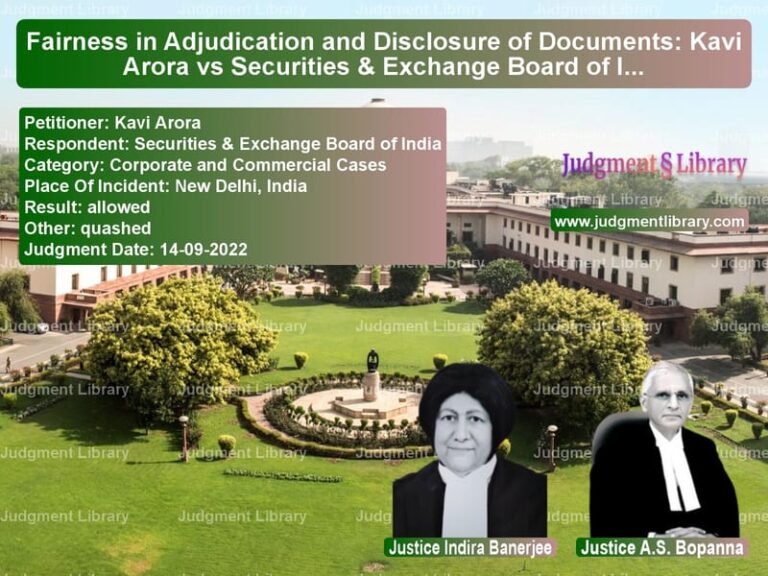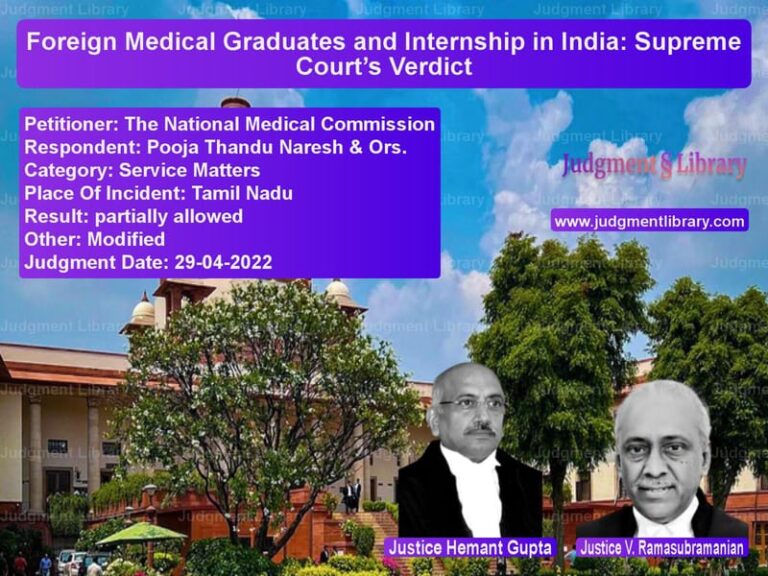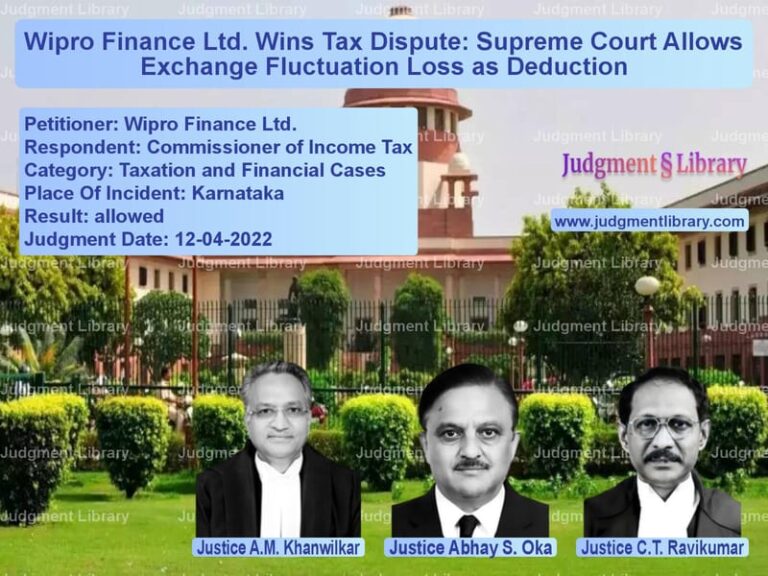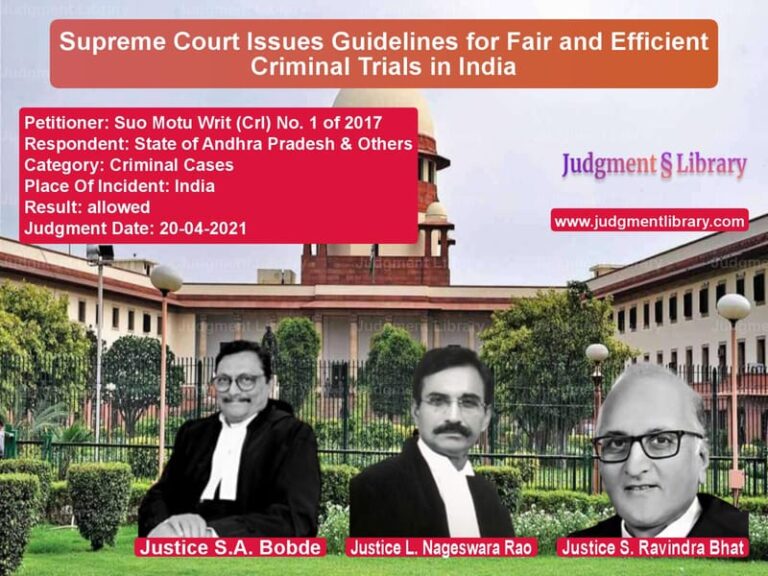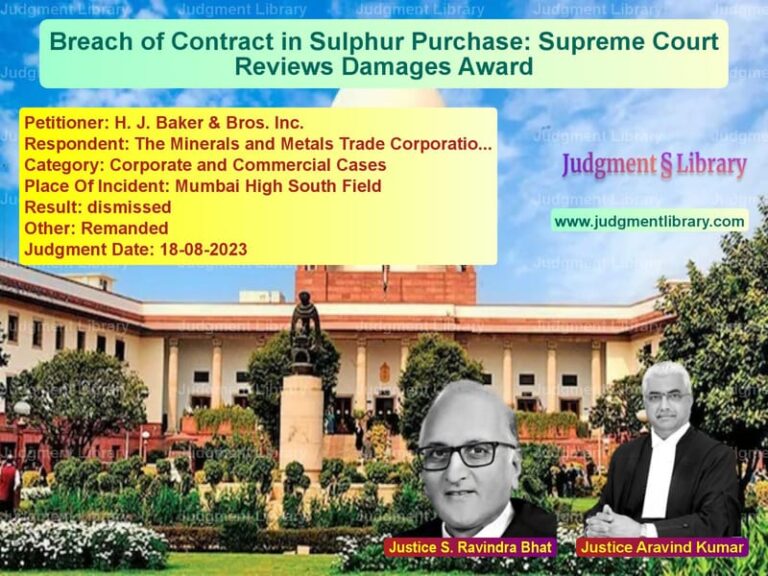Supreme Court Resolves Family Dispute Over Property Division and Will Execution
The Supreme Court of India recently ruled in the case of Ravinder Nath Agarwal vs. Yogender Nath Agarwal & Others, addressing a long-standing family dispute over property division and testamentary succession. The judgment settled the issue of transfer of legal proceedings between courts, ensuring a just resolution of inheritance claims.
Background of the Case
The case revolved around the estate of Late Badri Nath Agarwal, who passed away on May 7, 2011. His estate included significant immovable properties located in New Delhi and Nainital. The dispute arose among his children regarding the authenticity of his Will dated April 6, 2011, which allegedly revoked a prior Will dated June 26, 2005.
The legal proceedings included:
- A partition suit filed by Yogender Nath Agarwal in the Delhi High Court, later transferred to the District Court, Saket, New Delhi.
- A separate testamentary case initiated by Ravinder Nath Agarwal in the Uttarakhand High Court seeking letters of administration for the Will.
- Various ancillary litigations challenging mutation orders and property possession rights.
Petitioner’s (Ravinder Nath Agarwal’s) Arguments
The petitioner, Ravinder Nath Agarwal, contended:
- He was the rightful beneficiary of the properties under the latest Will dated April 6, 2011.
- The testamentary case in Uttarakhand should be prioritized as probate matters are considered in rem and should take precedence over partition suits.
- Due to his advanced age and health conditions, including a paralytic stroke, he sought the transfer of the partition suit to Nainital for convenience.
- The jurisdiction of the Uttarakhand High Court was more appropriate given the estate’s location.
Respondent’s (Yogender Nath Agarwal & Others) Arguments
The respondents, including Lily Nath, countered:
- The petitioner deliberately delayed filing the testamentary case, waiting until 2019 after losing interim relief in the partition suit.
- The partition suit was already under trial for nearly eight years in New Delhi, and transferring it at this stage would be unjust.
- The Will’s authenticity was disputed, necessitating adjudication alongside the partition case.
- The Supreme Court should ensure both matters are heard together to avoid contradictory rulings.
Supreme Court’s Observations
The Supreme Court, comprising Justice V. Ramasubramanian, made the following key observations:
- The partition suit had been pending since 2012 and could not be transferred merely for the petitioner’s convenience.
- The testamentary case was filed much later and appeared to be an attempt to complicate the dispute.
- The validity of the Will was crucial in determining inheritance claims, necessitating a joint hearing of both cases.
- “The petitioner himself filed a civil suit without seeking letters of administration, thereby admitting that he could assert his rights under the Will without prior probate.”
The Court emphasized:
“The interests of justice would be best served by transferring the testamentary case to Delhi, where the partition suit is already pending.”
Final Judgment
The Supreme Court ruled:
- Transfer Petition (C) No. 970 of 2016 filed by Ravinder Nath Agarwal seeking to shift the partition suit to Nainital was dismissed.
- Transfer Petition (C) No. 2779 of 2019 filed by Lily Nath was allowed, and the testamentary case was transferred to the Delhi High Court to be heard alongside the partition suit.
- The Delhi High Court was directed to ensure a speedy trial and permit video conferencing for elderly witnesses.
- Both matters were to be disposed of together to avoid legal inconsistencies.
Impact of the Judgment
This ruling has significant implications for inheritance disputes and legal jurisdiction:
- Precedent for Transfer of Cases: The decision affirms that related matters should be tried together to ensure consistency.
- Jurisdictional Clarifications: It reinforces that testamentary proceedings do not automatically override partition claims.
- Encouragement for Expedited Trials: The Court stressed the need to avoid unnecessary delays in property disputes.
- Protection Against Forum Shopping: The ruling prevents parties from strategically filing cases in different courts to delay proceedings.
Conclusion
The Supreme Court’s ruling in Ravinder Nath Agarwal vs. Yogender Nath Agarwal & Others resolves a complex family dispute with a pragmatic approach. By ensuring both the partition suit and testamentary case are tried together, the Court has minimized the risk of conflicting decisions.
This judgment provides clear guidance on handling overlapping legal proceedings in property disputes and sets an important precedent for future cases involving Will execution and inheritance claims.
Petitioner Name: Ravinder Nath Agarwal.Respondent Name: Yogender Nath Agarwal & Others.Judgment By: Justice V. Ramasubramanian.Place Of Incident: New Delhi and Nainital, Uttarakhand.Judgment Date: 12-02-2021.
Don’t miss out on the full details! Download the complete judgment in PDF format below and gain valuable insights instantly!
Download Judgment: ravinder-nath-agarwa-vs-yogender-nath-agarwa-supreme-court-of-india-judgment-dated-12-02-2021.pdf
Directly Download Judgment: Directly download this Judgment
See all petitions in Property Disputes
See all petitions in Succession and Wills
See all petitions in Specific Performance
See all petitions in Judgment by V. Ramasubramanian
See all petitions in partially allowed
See all petitions in Modified
See all petitions in supreme court of India judgments February 2021
See all petitions in 2021 judgments
See all posts in Civil Cases Category
See all allowed petitions in Civil Cases Category
See all Dismissed petitions in Civil Cases Category
See all partially allowed petitions in Civil Cases Category


